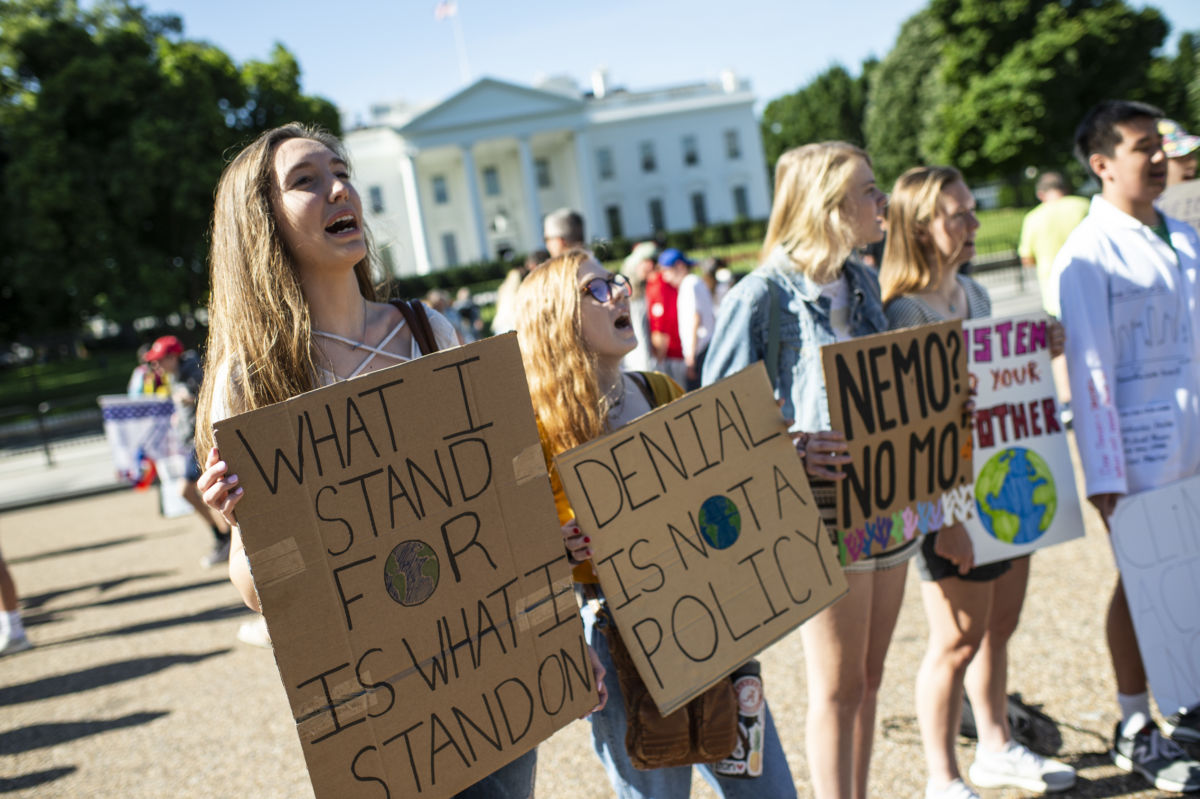Part of the Series
Covering Climate Now
A massive climate action is coming up this week, with strikes and protests planned from September 20 to 27. College students — along with younger students — are playing a central role in organizing this climate action, but they largely are not receiving explicit support from school administrators. Given the magnitude of the climate crisis we are facing, it is time for university administrators to drop their policy of “neutrality” and throw their support behind this youth climate uprising.
The current situation reminds me of a similar scenario in 2016, when I wrote a piece entitled “Standing Rock and Sitting Universities” that called out university presidents for not supporting the Standing Rock protest. In it, I cited journalist Scott Sherman, who asserts that the “timidity of presidents is particularly striking in the context of diminishing public funds for higher education.” Sherman ends his article quoting Leon Botstein, former president of Bard College, who said:
“A college president should be more outspoken than the average citizen. Failure to be in a leadership role in matters of public policy is an act of cowardice and an avoidance of responsibility. We need to teach our students that the civilized assertion of one’s beliefs is an obligation, an honor, and a pleasure.”
Over the past several years, we have increased awareness about the risks to the future of life on Earth. One might think that university administrators would be taking a stand in support of the September 20-27 event. It’s easy to plug in: The climate action organization 350.org tells adults how to support the student-originated strike that was inspired by Swedish teenager Greta Thunberg.
However, after an hour searching the internet for evidence of university presidents and provosts supporting the global climate strike, I’ve concluded that by and large administrators are expressing their usual silent neutrality toward the planned protests. In spite of an open letter from several hundred college professors, the “neutrality” policy of higher education’s leaders (which can in practice often result in marked hostility toward student protests) seems entrenched.
Even the new University Climate Change Coalition (UC3), which professes to be a “bold” collection of universities hoping to “help local communities achieve their climate goals,” ignores historian Howard Zinn’s famous book title, You Can’t be Neutral on a Moving Train. Philip DiStefano, chancellor of one of the 20 member schools, invoked “neutrality” in his speech at this summer’s UC3 conference at the University of British Columbia. He says, “As a neutral convener, we work to bring together leaders … to explore and advance solutions to society’s most complex problems, including climate challenges.”
Janet Napolitano, president of the University of California, spoke similarly at the conference. After talking about how solutions to climate change lie at an intersection of “research, education and public service,” she said, “leaders of great public institutions should take positions on great public questions, but need to do so with an ‘appropriateness’ lens.” The Vancouver Sun summed up her overall message as implying that “universities have a role in urging governments to take climate change more seriously — so long as they don’t take political sides.” I propose that such contradictory language, spoken by the former secretary of homeland security under Obama who touted climate change as a significant national security threat, is typical for politicians but should not be for university presidents.
Even the American Association for Sustainability in Higher Education (AASHE), with its thousands of university members, says no more about the September 20-27 event than a brief announcement on its calendar of events taking place, writing “millions of people of all ages will walk out of their workplaces and homes to join young climate strikers on the streets and demand an end to the age of fossil fuels.” If this is the best that an organization dedicated to higher education’s involvement in sustainability can do, we can understand why scholars like Henry Giroux see the educational status quo as a hegemonic enterprise.
Rita Bornstein is former president of Rollins College, and an authority on university leadership. According to the Boston Globe, in assessing universities’ stands on immigration policy, Bornstein has taken the position that “democratization of opinion has dimmed some of the moral authority of college presidents, as with other elites.” However, calling this silence of higher education leadership a “democratization of opinion” is just another way of saying that administrators fear losing the support of conservative funders who see human rights and a healthy climate as risky political issues.
Although many individual teachers in the world can take some degree of credit for setting the stage for this forthcoming Global Climate Strike, it is ultimately the determination of a young student — Thunberg — that is responsible. Thunberg started walking out of school in August 2018 as a 15-year-old, holding a sign calling for climate action, and inspired millions of other students across the world to join her through similar protests.
If higher education’s leaders are unable to affirm and mirror Thunberg’s support for desperately needed climate action, we should look elsewhere for leadership. Perhaps, as the recent UN Extinction Rate Report offers, we should look to the world’s Indigenous leaders who are on the front lines of climate change activism.
This story is part of Covering Climate Now, a global collaboration of more than 220 news outlets to strengthen coverage of the climate story.
Join us in defending the truth before it’s too late
The future of independent journalism is uncertain, and the consequences of losing it are too grave to ignore. To ensure Truthout remains safe, strong, and free, we need to raise $31,000 in the next 48 hours. Every dollar raised goes directly toward the costs of producing news you can trust.
Please give what you can — because by supporting us with a tax-deductible donation, you’re not just preserving a source of news, you’re helping to safeguard what’s left of our democracy.
